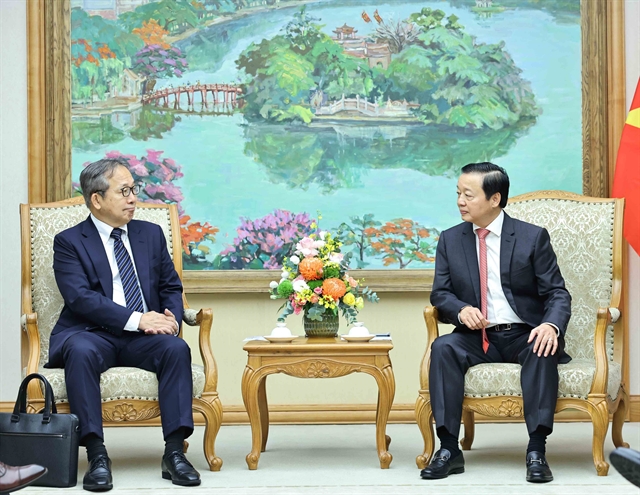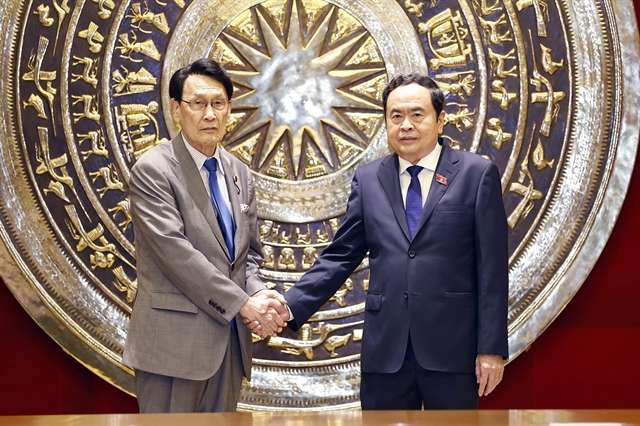 Politics & Law
Politics & Law

 |
| National Assembly Chairman Trần Thanh Mẫn (right) and Tokai Kisaburo, member of the House of Representatives of Japan and Chairperson of the Policy Research Council under the Liberal Democratic Party (LDP) in Hà Nội on Thursday. — VNA/VNS Photo Doãn Tấn |
HÀ NỘI — National Assembly (NA) Chairman Trần Thanh Mẫn hosted a reception in Hà Nội on Thursday for Tokai Kisaburo, member of the House of Representatives of Japan and Chairperson of the Policy Research Council under the Liberal Democratic Party (LDP).
On behalf of the Party and State leaders and people of Việt Nam, Mẫn expressed sincere gratitude to Prime Minister Kishida Fumio, Speaker of the House of Representatives Nukaga Fukushiro, President of the House of Councillors Otsuji Hidehisa, and members of the Japanese Parliament for their messages of condolences on the passing of Party General Secretary Nguyễn Phú Trọng.
He also thanked former PM Suga Yoshihide, Senior Advisor of the Japan-Việt Nam Parliamentary Friendship Alliance, who, as a special envoy of Prime Minister Kishida, led a Japanese delegation to the state funeral in Hà Nội. This gesture reflects the appreciation and respect of the Government, Prime Minister, and people of Japan for General Secretary Trọng and the Việt Nam-Japan Comprehensive Strategic Partnership.
Affirming that the Việt Nam-Japan relationship is currently at its best stage, the NA Chairman stated that bilateral political trust continues to be strengthened, with frequent exchanges of high-level and all-level delegations; economic, trade, and investment cooperation boosted in an in-depth, more substantive, and effective manner; and labour and education cooperation, and collaboration between localities, and cultural and people-to-people exchanges becoming closer.
To further enhance the bilateral relations, the Vietnamese top legislator suggested continuing to intensify the exchange of high-level and all-level delegations, increase exchanges between parliamentarians, especially young and female parliamentarians, and strengthen the sharing of legislative experiences between the two countries.
Regarding economic cooperation, Mẫn proposed Japan continue to support Việt Nam in its industrialisation and modernisation efforts and in ensuring economic independence and integration into the global economy, improving the investment environment and addressing issues related to official development assistance (ODA) and foreign direct investment (FDI) cooperation between the two nations.
He expressed his hope that Tokai will support and prompt the Japanese Government to provide new generation ODA, with high incentives and both simple and flexible procedures, to Vietnam, focusing on large-scale strategic infrastructure development projects such as urban and high-speed railways, promoting investment and technology transfer of Japanese enterprises, supporting Vietnamese enterprises’ engagement in the global value chain of Japanese partners, and considering the opening of the market to Vietnamese fruits.
Mẫn also proposed the Japanese official to push the Japanese Government to simplify procedures and move towards visa exemption for Vietnamese people entering Japan to further facilitate people-to-people exchanges.
Regarding education and training, he suggested Japan continue to support Việt Nam in training strategic-level officials and leaders, andboost cooperation in student exchanges by increasing the number of scholarships for Vietnamese students to go to Japan.
There are currently nearly 600,000 Vietnamese people in Japan, making it the second-largest Vietnamese community in the world.
Mẫn proposed that Japan offer preferential policies and create conditions for the Vietnamese community to study and work in Japan, as they make a significant contribution to Japan's socio-economic development and serve as an important bridge for the bilateral relationship.
As for cooperation in new areas, the top legislator suggested the two countries pay attention to and ramp up cooperation in green transition, digital transformation, emissions reduction and energy transition; and continue to promote more cooperation programmes and new projects within the framework of the Asia Zero Emission Community (AZEC) Initiative. He asked for Japan’s support for Việt Nam in achieving the goal of training 50,000 semiconductor engineers by 2030.
Mẫn also voiced his hope that the two sides will strengthen coordination in, share stances, and cooperate on regional and international issues of shared concern, including the East Sea (known internationally as the South China Sea) issue.
Tokai Kisaburo, for his part, extended his deepest condolences to the Party, State, and people of Việt Nam over the passing of General Secretary Nguyễn Phú Trọng.
He expressed his confidence that under the leadership of NA Chairman Mẫn, the Vietnamese legislature will develop further, and the relationship between the two parliaments will continue to be strengthened in the time ahead.
He said that his visit aims to intensify bilateral collaboration in education-training, science-technology, and innovation.
Agreeing with Mẫn's proposals, the Japanese official expressed his hope that the Vietnamese legislature will continue to build a transparent legal corridor, improve the investment and business environment, simplify administrative procedures, and create favourable conditions for Japanese firms to invest and do business in Việt Nam. — VNS




